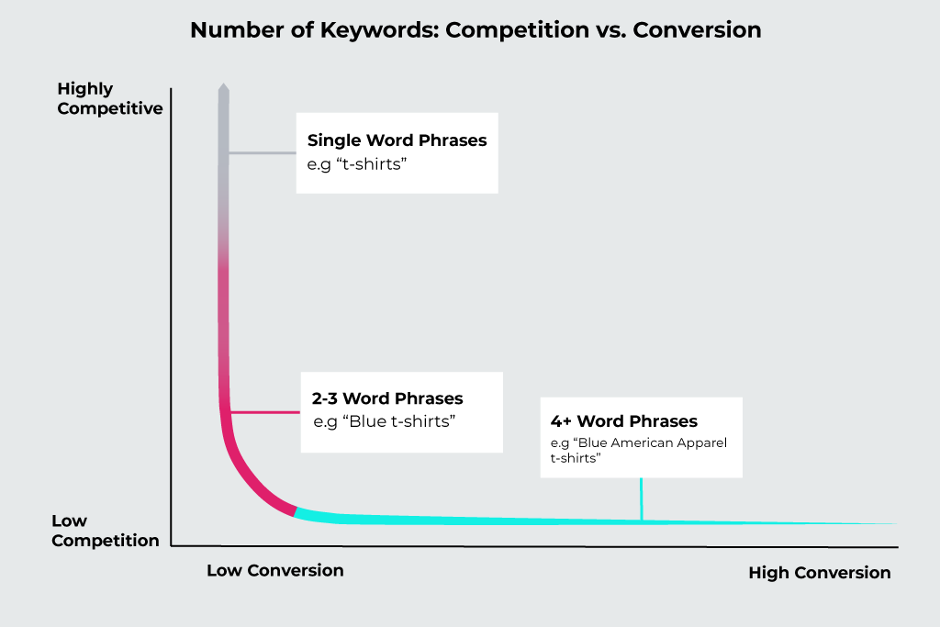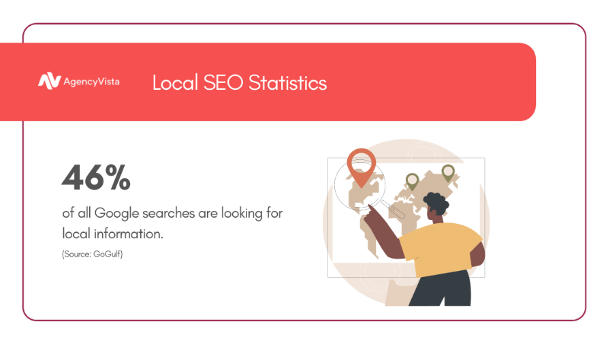Picture this: You start a new business of selling the best speakers online. The keyword that you choose to target is most likely going to be “buy the best speakers online,” isn’t it?
Considering that there are at least over a thousand businesses that target that keyword to win the race of ranking at the top on global search engines, you have already lost the battle.
Proper keyword research is one of the most underrated aspects of SEO.
Your company’s online success depends on search engine optimization (SEO). Keyword research should be a top priority while executing a digital marketing activity. Keywords link internet surfers to content based on the phrases they are searching; landing them to your website.
The significance of SEO discipline can be realized by the fact that the size of the digital market is predicted to reach $1.6 billion by 2027 at a CAGR of 14.4%. However, very few people know how to find the most appropriate keywords for a business.
So, here, we debunk the biggest SEO keyword research mistakes that you should watch out for:
1. Using Irrelevant Keywords
A lot of marketers misunderstand the target audience and end up targeting a keyword that no one is going to search for.
Knowing your customers is an important aspect while choosing relevant keywords. For example, if you are dealing in shirts, you must choose related keywords that contain the word “shirt.” These may include t-shirt, sweatshirt, etc.
At the same time, make sure that you do not change the meaning of your service. For instance, in this image, you can see that some of the mobile app development companies have used “mobile app development course” as one of its targeted keywords.

Source: Kraftblik
As a result, while their website ranks (in Google ads) when a user types in that search query, it’s quite irrelevant for the user.
You must also remember that people in different localities may call the same product with different names. For instance, someone who doesn’t know the difference between sneakers and running shoes can be looking for the same product using two different names. See where I’m going with this?
As professionals concentrate more on using exact or closely related keywords, they often neglect the related keywords and phrases that Google’s AI can relate with.
So, what should be the approach for significant keyword research? Simply think and write like a common human being rather than thinking through an SEO perspective.
You may want to neglect certain words that are deviating from your core service plan, but these may be helpful for the searchers to find your content on the web quickly.
2. Neglecting Searcher’s Objective
Marketing professionals believe that the biggest keyword research mistake is forgetting searcher intent. Your prime focus should not be to drive more traffic to your site but concentrate on driving more conversions. Remember, you want to break your landing page to the the top 10% — these are the ones with conversion rates of 11.45% or higher.
Try to match your content with the point of view and focus on what they are actually searching.
You can’t just pull keywords out of the earth without understanding the needs and objectives of your clients. Prepare a proper blueprint to understand the exact needs before creating your content.
It can be a good idea to prepare a questionnaire for the buying experience of your customers while you are researching keywords. What was the first word that came to their mind for the keyword they Googled? Use these answers to find out keywords that will help you bond with your prospects in a better way.
Moreover, research within the industry discussion forums and other social media groups to know what people are talking about more. Keep a close watch on the market trend to understand the searcher’s objective and adjust your keyword search accordingly.
An example that comes to my mind is the term “covfefe.”
Makes zero sense, is gibberish, probably not even English.
But it was used by one of the most powerful people in the world, Mr. Donald Trump. He mistakenly wrote covefe for coffee or it was just his unique way of spelling it; nobody knows.

Source: USA Today
Sooner than later, the number of searches for covfefe instead of coffee significantly increased. The search keyword “covfefe mug” yields 1,65,000 results.
Imagine if you were a coffee seller who targeted that keyword. Doesn’t hurt to say you could be a millionaire, does it?
3. Using One-Word Keywords
If you are using single-word keywords, then you are probably on the wrong track. It is really hard to achieve high ranks with a one-word search, as they are too competitive to stand alone.
Moreover, these types of keywords may lack the reader’s intent.
For example, if you use chair as a keyword, it may stand in less context with lounge chairs, massage chair, sofa chair, etc. An additional word helps add more focus to the user intent, thus bringing them close to your marketing campaigns.
Therefore, the use of long-tail keywords and phrases adds more value to your keyword search, as it provides more information to the potential customers.
Searches of more than four words make up 95.88 percent of Google searches.

Source: accelerate agency
However, this SEO strategy can sometimes bring more harm than good when you don’t have a solid plan behind keyword research. The key is to stay well focused on your topic and use internal links containing related keywords so that readers end up spending more time on your web page.
The more time a visitor stays on a page, the more are the chances that they will use your product or service.
Also, keep in mind that Google supports queries raised in the form of a question or phrase. So, design your keyword to be a question. For example, instead of saying “kale has zero calories”, say, “does kale have zero calories?”
4. Not Looking at Your Competitor’s Ranking
If you’re not looking at your competitors, you’re losing!
See what your competitors are ranking on. Figure out their strategy. Get into their shoes.
Let me tell you how to find the keywords your competitors are targeting.
Just type a product or service query in the search engine and find out the websites that are on the first page. A few hits and trials, and you’ll be able to see the keyword on which your competitor’s website is ranking.
Figure out your SERP competitors. Make a note of how they are answering the searcher’s query and use that to create your own strategy.
For an effective SEO strategist, it is also crucial to watch for the digital campaigns your competitors are planning. This will assist you to plan your future activities and guide you to rank higher in search engine results.
5. Concentrating Only on One Search Engine
We all know that Google is the king of search engines, so much so that it is today synonymous with searching something online.
However, that shouldn’t be an excuse for you to ignore doing SEO for other search engines like Baidu, the biggest search engine in China.

Source: ClickZ
You must also focus on putting some efforts in Baidu SEO.
You get to tap into a huge region that you would have missed out on had you only focused on Google.
Try to expand your search horizon apart from the traditional places. Study for the patterns in the searchers of your target audience and hit your target correspondingly.
6. Ignoring Local Keywords
While researching keywords, analysts generally overlook the difference between their target audience based on their location.
Your customers may be global or they may belong to a local area. When your business activities are local, ensure to target keywords that are in use in your vicinity.

Source: AgencyVista
Google’s keyword tool helps filter searches based on location. So, if you use relevant words based on location, they are ought to provide better results.
You should also focus on typical geographical search terms. There are users who like to add the name of their city for their query, as they want those particular services in their area. Optimization of location-based keywords is a good SEO practice to generating more relevant traffic to your page.
7. Not Evaluating Your Keyword Search Results
If you’ve come this far, I am guessing that you have found the most relevant and focused keywords for your audience.
However, that doesn’t mean that you can stop there. You must review the performance of these keywords. If you are unaware of how well your strategy is working, everything is going in vain.
Periodic evaluations help to optimize your site. Go to different search engines, search for your keywords from time to time, and see where you rank.
Remember that SEO is an everlasting process, and not evaluating your target keywords will gradually push your ranking down. With the change in customer behavior, markets change over time. So, regular keyword reviews are one of the important aspects of a successful SEO strategy.
Once reviewed, your objective should be to remove poor-performing keywords and add more relevant keywords as per the market needs. Look out for the areas you are lacking to shape your future SEO strategy.
Boston Matrix is one of the effective ways to evaluate the performance of your portfolio. It assists you in finding your weaker areas and eradicate them.
8. Stuffing Keywords After Content is Already Written
Some SEO experts practice inserting keywords after an article is written. They like to repeat the keywords a number of times to make search engines rank them promptly.
Moreover, some writers who are less familiar with SEO practices stuff keywords making content irrelevant. How can you think that you will meet the client’s requirements when research is your second priority?
Check this piece of article.

Source: SE Ranking
The term “vacuum cleaner” is simply exploited. Does this not come across as spammy? Would you waste your time reading this?
Ensure that you perform well-practiced SEO keyword research beforehand and lay a solid foundation for your content. Build your content strategically to meet the reader’s need. Maintain a 1-2% keyword density and do not go overboard.
Never develop a habit to use keywords as an add-on, especially once the article has been completed.
9. Not Knowing Why You Should Use Plural or Singular Keywords
Google AI is smart enough to understand the forms of singular and plural words. However, at times, it displays different results, as what users are looking for may slightly differ.
It becomes important as an expert SEO practice to get into the shoes of your target audience and figure out how they are going to search. Will they use a singular term or will they go for a plural form?
With a singular version, a user may be looking just for the information, while with a plural version, they may require to compare products or buy something.
Watch out for whether you should use the phrase ‘black shoe’ or ‘black shoes.’
Similarly, if you will search for ‘SEO agency’ and ‘SEO agencies,’ Google will provide you with totally different results.
Search results for SEO Agency

Search results for SEO Agencies

Keep a close watch when conducting SEO keyword research to understand the use of both versions.
So, Which of the Above Mistakes Are You Making?
As per the survey by Databox, you must start your SEO efforts with keyword optimization before going into deeper technical SEO.
Additional Resources:
- The Ultimate Guide to Understanding People Also Search For In Google Search
- How to Find Profitable Long Tail Keywords (Step-by-Step Guide)
- How to Dominate Google First Page For Any Keyword



Perfect guide, I am quite sure after reading this that my keyword research process will be much better from now on. 5th Point is so relatable for me. I was only focusing on Google till now.
Hello Lalit,
Great article! the points you have mentioned in this article are correct and many people know all these things. But while keyword researching people forget many of these points. I hope this article will help to digital marketers to memorize each and every points you have mentioned in your article.
Thank you for sharing this article!
Hay Mr. Lalit Sharma,
Great Content, Proper discuss for SEO Keyword research. Thanks sharing for valuable article.
Glad you found it valuable, Akash.